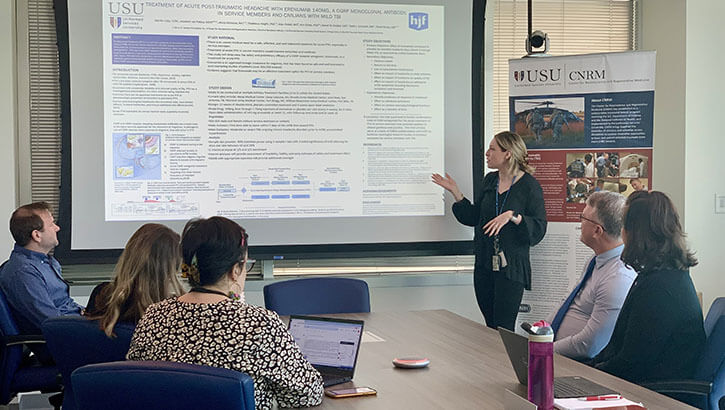Pioneering Post Traumatic Headache Study Kicks Off
Health.mil | 2022-07-15

A new, first-of-its-kind study is underway to fulfill a critical need for treating post-traumatic headache (PTH), for which no treatments currently exist. The multi-site study, led by the Uniformed Services University’s Center for Neuroscience and Regenerative Medicine (CNRM), has started to enroll participants and will test how well a migraine medication – erenumab – could be used to treat this condition, which affects about half of those who experience mild traumatic brain injuries.
PTH is a secondary headache disorder that develops within seven days after a head and/or neck injury. It is also frequently experienced after mild traumatic brain injuries, and can persist long after injury.
The trial, “Treatment of Acute Post-traumatic Headache with a CGRP Receptor mAb in Military Service Members and Civilians with Mild Traumatic Brain Injury,” is the first randomized, placebo-controlled, multi-site trial to study the safety and effectiveness of using erenumab to treat PTH. The trial aims to enroll 404 participants by the end of 2026, and is currently open to the following military treatment facilities: Naval Medical Center Camp Lejeune, Brooke Army Medical Center, and Womack Army Medical Center. A fourth site, William Beaumont Army Medical Center, is expected to be open to participants later this year.
“Currently, there are no approved treatments specifically for post-traumatic headache,” said Army Lt. Col. (Dr.) Bradley Dengler, CNRM Director and neurosurgeon. “If successful, this erenumab treatment would be among the very first evidence-based approaches to reduce or eliminate headaches shortly after mild TBIs, with the potential to return soldiers to duty faster than current therapies.”
“This is a step forward for the millions of people affected each year by post-traumatic headache,” said Annabel Lee Raboy, the trial’s Research Manager and employee of the Henry M. Jackson Foundation for the Advancement of Military Medicine. “Our study team has deeply-rooted personal and professional ties to our nation’s active duty and veteran communities. We’ve all experienced or witnessed the impact PTH can have on a patient and their loved ones. It’s an honor to support a trial that could identify a solution.”
To learn more about the trial, please contact cnrmstudies@usuhs.edu or visit https://www.clinicaltrials.gov/ct2/show/NCT05049057?term=david+brody&draw=2&rank=6. For more information about CNRM, visit https://cnrm.usuhs.edu.
Topic Categories
-
Military Medicine 101
-
Applying + What to Expect
-
Education + Training
-
Careers + Lifestyle